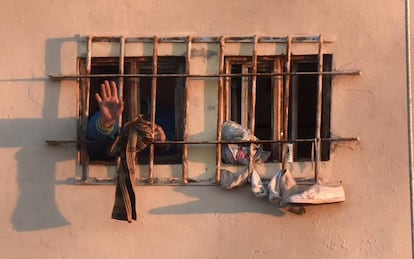Drug cartels “rule half of Mexico’s prisons,” new report reveals
Human rights study highlights government “indifference” to overcrowding and violence


More than half of Mexico’s prisons (54%) are effectively run by powerful drugs cartels, according to a report by the country’s National Human Rights Commission. “Inmates exercise control over the rest of the prisoners through violence,” reads the study, which blames cartel members for the Topo Chico riot in Monterrey in February in which 49 men were killed, some of them decapitated.
Mexico’s prison system could be described as an abyss on the point of collapsing in on itself and its population of 250,000 inmates. The government has repeatedly backtracked on promises of reform, while a draft bill to protect prisoners’ rights and improve conditions has been stalled for the last three years in Congress. Last year 2,110 violent incidents were reported, along with six full-scale riots, 23 alleged suicides, 55 cases of abuse, 54 murders, 250 acts of disorderly conduct and 1,382 brawls.
The facts do not allow us to conclude that the penitentiary system is organized and operated on the basis of respect for human rights
Luis Raúl González Pérez, National Human Rights Commission president
In preparing its report, the National Human Rights Commission visited 130 of the country’s 359 jails, concluding: “The main deficiencies relate to the classification of accused or sentenced prisoners, overcrowding, lack of work activities and training... poor security and lack of escort personnel, as well as prevention of and attention to violent incidents, meaning there is not enough being done to prevent incidents such as brawls, injuries, escapes, homicides and riots.”
The commission found that 54% of Mexico’s jails are overpopulated, noting that in cells “where four inmates should be housed, there are sometimes up to 30,” adding that many jails have “privileged areas” ruled by cartels.
Infectious diseases, mental illness, the absence of “programs to prevent addiction and voluntary detoxification,” along with “deficiencies in facilities’ physical conditions and hygiene” all reveal the Mexican authorities’ chronic indifference, particularly in the states of Nayarit, Quintana Roo, Guerrero, Hidalgo and Tabasco, says the report.
“The facts do not allow us to conclude that the penitentiary system is fully organized and operated on the basis of respect for human rights, and where work, training, education, health and sports are the means for inmates’ rehabilitation to avoid them reoffending,” Luis Raúl González Pérez, the commission's president, notes.
English version by Dyane Jean François.
Sign up for our newsletter
EL PAÍS English Edition is launching a weekly newsletter. Sign up today to receive a selection of our best stories in your inbox every Saturday morning. For full details about how to subscribe, click here.
Tu suscripción se está usando en otro dispositivo
¿Quieres añadir otro usuario a tu suscripción?
Si continúas leyendo en este dispositivo, no se podrá leer en el otro.
FlechaTu suscripción se está usando en otro dispositivo y solo puedes acceder a EL PAÍS desde un dispositivo a la vez.
Si quieres compartir tu cuenta, cambia tu suscripción a la modalidad Premium, así podrás añadir otro usuario. Cada uno accederá con su propia cuenta de email, lo que os permitirá personalizar vuestra experiencia en EL PAÍS.
¿Tienes una suscripción de empresa? Accede aquí para contratar más cuentas.
En el caso de no saber quién está usando tu cuenta, te recomendamos cambiar tu contraseña aquí.
Si decides continuar compartiendo tu cuenta, este mensaje se mostrará en tu dispositivo y en el de la otra persona que está usando tu cuenta de forma indefinida, afectando a tu experiencia de lectura. Puedes consultar aquí los términos y condiciones de la suscripción digital.








































